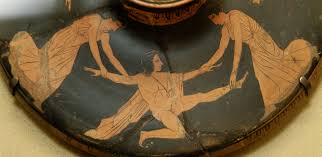I don’t know the whereabouts of my copy of Pascal’s Pensées. I imagine it’s lying somewhere in one of my parents’ spare bedrooms, its tricky French languishing there unread, awaiting the time when I discover the urge to locate and read it once again. I won’t pretend. I’ve never spent much time on Pascal. But he’s still a figure who interests me (I have a large soft spot for any good pre-enlightenment philosophe), and I remember reading a particularly interesting and lucid exposition of his famous ‘wager’ in a book by the philosopher John Cottingham.
Pascal’s wager was a topic that came straight to mind early this morning, in one of my A level Classical Civilisation classes. We are currently reading Euripides’ Bacchae, the famous play in which the king of Thebes, Pentheus, refuses to recognise or honour the god Dionysus, despite warnings that he must do so from all and sundry around him. The result of Pentheus’ failure to recognise the god is dreadful: he is brutally dismembered by the worshippers of Dionysus (a troupe of women known as maenads). Before this terrible fate unfolds, Pentheus unwittingly rejects an opportunity to avoid this terrible conclusion, by dismissing the arguments of some of the wise old men of his city – Kadmos and Tiresias.

The arguments of both old men are interesting, but that of Kadmos particularly caught my eye today. Doubtless I haven’t been paying enough attention to the text of the Bacchae when I’ve read it in the past, but I didn’t before realise that right there, in Euripides’ text, is a clear intellectual antecedent of Pascal’s wager itself, placed on the lips of wise old Kadmos.
‘My boy’, says Kadmos, addressing Pentheus, who has already shown himself to be an individual who is going to be difficult to help. ‘Live as we [i.e. Kadmos and Tiresias] do, and not beyond the order of the laws’. ‘Even if this is not the god’, he continues, ‘consider him a god and call him such!’. Kadmos proceeds to warn Pentheus that failing to worship the god could result in a terrible fate, similar to that of Actaion, the hero of Greek myth, who is torn to shreds by dogs. Pentheus is not persuaded.
There is a clear parallel here with Pascal, whose most famous argument (very loosely) is that individuals have very little to lose by believing in and worshipping God (and much, potentially, to gain) – whereas there is much, potentially, to lose by not believing in him (i.e. for Pascal, eternal damnation), and very little to gain…therefore you should believe in him! (A proper and thorough explanation of this wager is offered here for anyone dissatisfied with my cursory description).

Anyway, I found myself feeling surprised by Euripides’ prescience – though maybe I shouldn’t have been. At least one internet encyclopedia of philosophy comments that Pascal’s wager is anticipated in Euripides’ Bacchae – so I certainly can’t claim any great insight in noticing the connection. Nonetheless, I find it a bit strange that some of the most eminent commentators on the text – Dodds, Segal – don’t comment at all on what seems to me a quite remarkable argument (‘worship someone to avoid something terrible – and don’t worry too much if they’re not in fact a god after all!’).
Reading around this topic a little this evening, I am now particularly struck by Eric Csapo’s observation that the whole of the Bacchae, as a play, has occasionally been seen as evidence of a kind of deathbed conversion on the part of Euripides. Euripides is a poet who has often been seen as decidedly anti-theistic. By contrast the Bacchae itself, says Csapo, has been seen as a ‘last cynical Pascal’s wager’ on the part of the poet, particularly on account of its vivid portrayal of the terrible fate that may await an individual like Pentheus who refuses to honour or recognise the gods.
I suppose the lesson of my encounter with the Bacchae today might be summed up like this: there are always new things to discover in ancient texts; or, rather, there are new old things to discover in ancient texts, and unexpected connections to notice too.
I am left to wonder whether Pascal may in fact have read Euripides. This is a question whose answer I haven’t yet been able to find.

